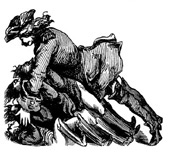
Bertrand Russell: Prophet of the New World Order
"THERE IS A FIERCE HATE IN ME"
In many ways, what the Englishman Bertrand Russell stood for characterizes the ideas and forces of the 20th century which have emerged triumphant today. Despite his reputation as a mathematician and philosopher of science, Russell is known primarily for his work as a social philosopher and advocate of world peace. Depending on your viewpoint, he may have been one of the greatest peacemakers of the epoch or one of its greatest villains.
Bertrand Russell was born in 1872. His public career began in 1900, and spanned seven decades until he died in 1970. He was a primary leader and spokesman for one of the great philosophical movements of the early century. This movement consisted of physical and social scientists known as Positivists — also known as the Vienna Circle. Bertrand was the grandson of Lord John Russell, a Prime Minister of Great Britain under Queen Victoria. Bertrand’s official title was Viscount Amberley, the third Earl Russell. He was also a popular author who wrote on a wide range of topics such as culture, morality, and politics.
Russell popularized many of the new scientific currents. One of his most successful books, The ABC’s of Relativity, explained Einstein’s abstruse propositions about space and time for the layman; what millions of people knew as Einstein’s famous theories came from Russell’s book. He had a clear and readable style which got right to the heart of an issue. He is often compared as a philosopher to John Dewey but was a much superior writer. Although all the existing biographies of Russell provide much useful information, they overlook his darker side. The exception is a 1996 book by Raymond Monk which at least explores the man’s highly unstable psychology. The great activist and spokesman for world peace and disarmament was, on closer inspection, something of a Dr. Jekyll and Mr. Hyde.
Bertrand lost both father and mother at a very early age. In his sixth year he was placed in the home of his elderly grandmother. In his autobiography Russell complains bitterly about the stifling tyranny and repression he endured while living in her home. Unlike his older brother who rebelled and left home, little Bertie remained her pet, never openly defying his granny. He said he developed an overwhelming rage which, to keep the peace at home, he completely suppressed during his childhood. Whether his grandmother did him any harm is hard to say; however, there is no doubt he developed some serious psychological problems. In his autobiography he speaks about his plan to commit suicide as an adolescent, a plan which was abandoned when he realized it would mean never learning any more mathematics. Despite his great intellect he displayed the personality of an iconoclast and a misanthrope all his life. The primary motivation of Russell’s intellectual effort was the removal of cultural repression, which he attributed to traditional religion. He set his mind to the task of eliminating the influence of Christianity on Western culture.
You May Also Enjoy
As soon as ethics chooses to sever its contact with religion -- as is fashionable in our decadent society -- it becomes a caricature of any true ethics.
The traditional left and mainstream right are in the same camp, usually competing over the externals of governance, not the real substance of policy.
Reviews of Marriage: The Dream That Refuses to Die... Miss Betsey: A Memoir of Marriage...

